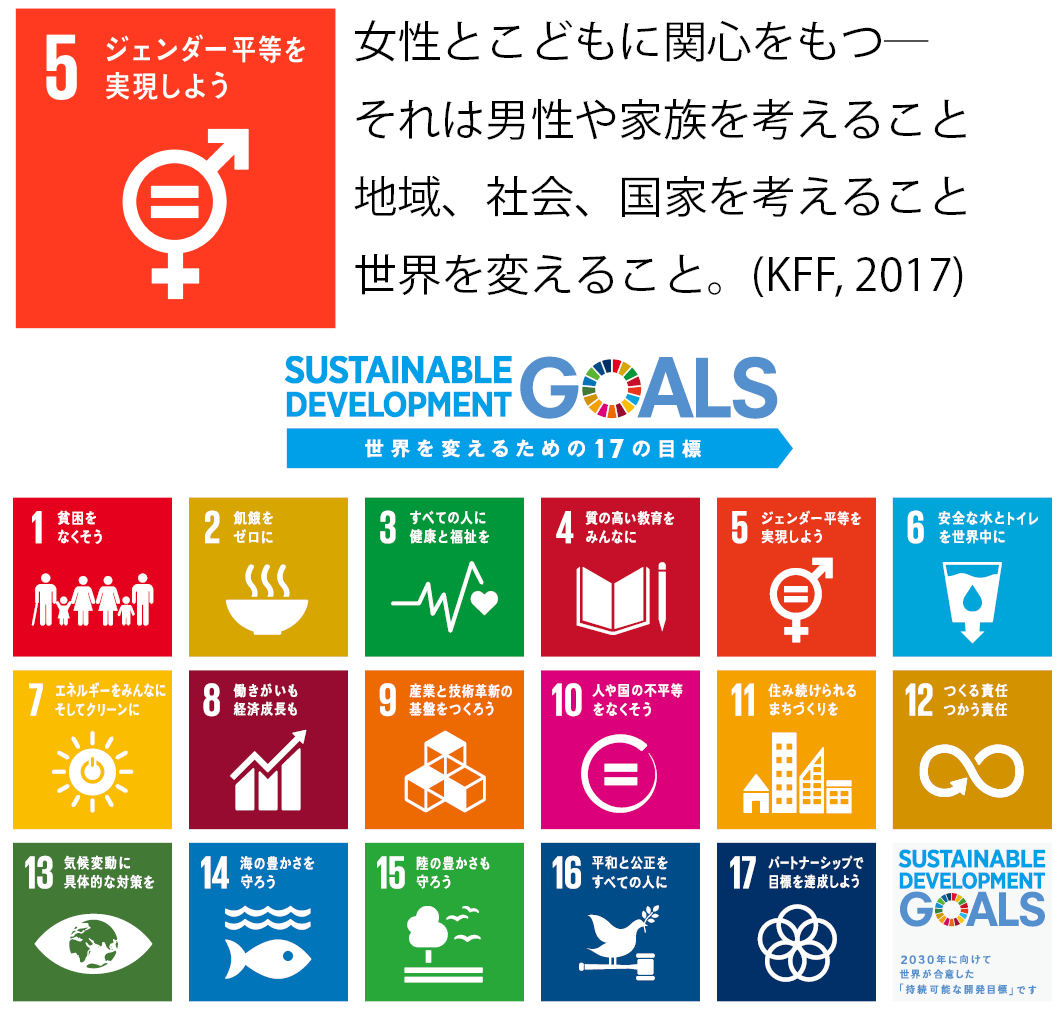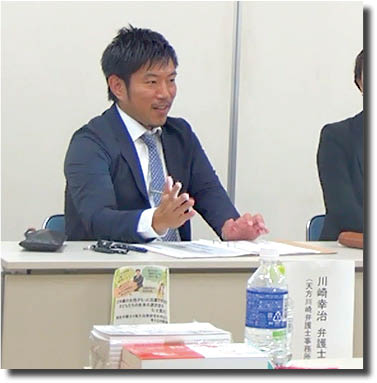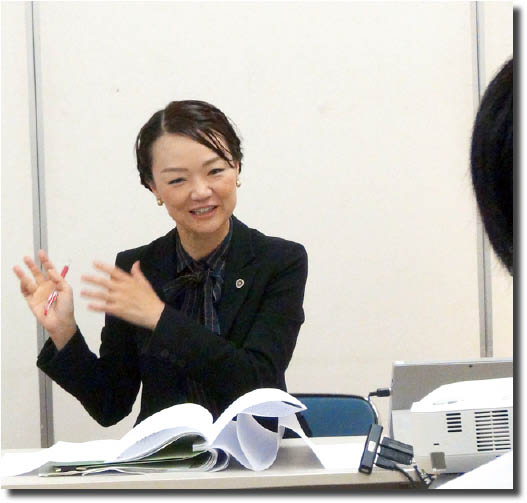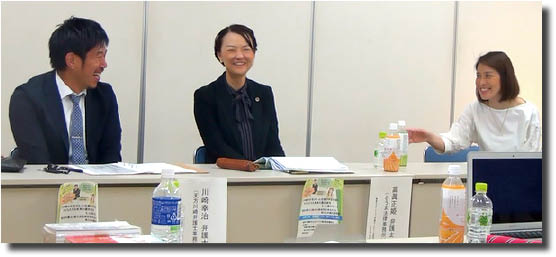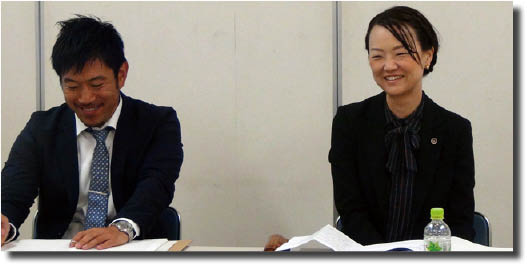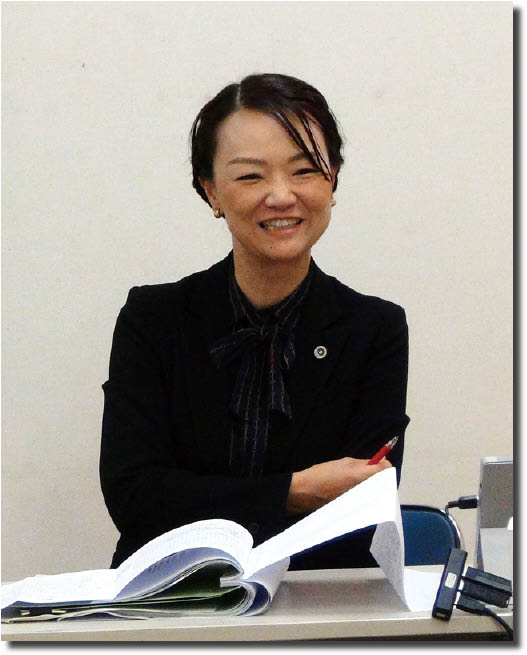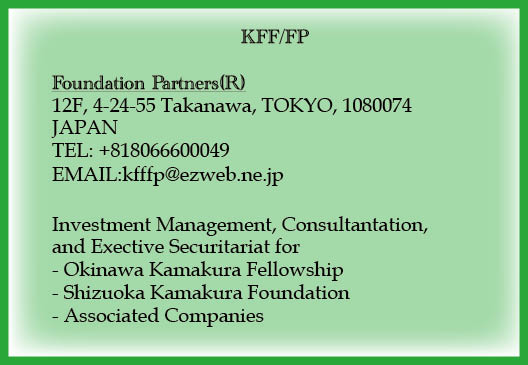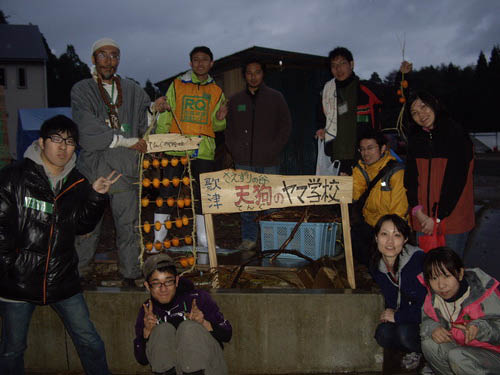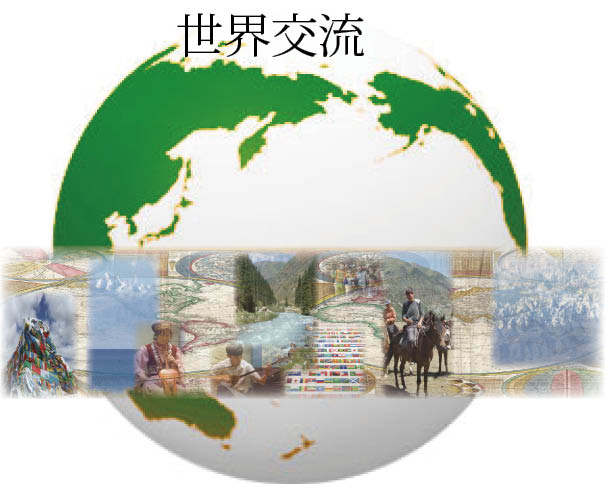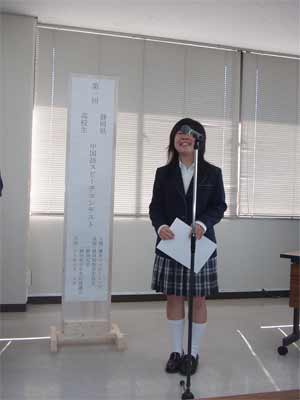|
World Assembly for Women Make Okinawa More "Gender-Equal," And Giver Children More Future Choices! |
|||||||||||||||||||||||||||||||||||||||||||||||||||||||||||||||||||||||||||||||||
|
|
KFF SYMPOSIUM ON GENDER EQUALITY 1 Make Okinawa More “Gender-Equal,” And Give Children More Future Choices! Talks on Various Problems Surrounding Okinawan Region with Local Lawyers and Law School Students from the University of the Ryukyus. August 26, 2017 Lecturer: 1. Ms. Masahime TOUMA (Lawyer, Toma Law Office, Okinawa.) 2. Mr. Kouji KAWASAKI (Lawyer, Amakata Kawasaki Law Office, Okinawa.) Opening Speech: Junji KAMAKURA (KFF Representitive Director) Moderator: Chiaki KAMAKURA (Public Broadcasting Anchor, hereinafter KAMAKURA) Lecturer (Two Lawyers from Okinawa) 1. Ms. Masahime TOUMA (Lawyer, Toma Law Office, Graduate of Law School of the University of the Ryukyus.) 2. Mr. Kouji KAWASAKI (Lawyer, Amakata Kawasaki Law Office, Graduate of Law School of the University of the Ryukyus.) KAMAKURA: Could you talk about your experiences as a lawyer regarding the matter of the poverty of children? KAWASAKI: Basically, my actual impression as a lawyer is that children who commit crimes tend to have a single-parent family. When I have a meeting with a kid who has committed a crime, I call on him or her to reflect on his or her past conduct that caused trouble, and ask him or her to think about what he or she is going to do or wants to be in the future. And every time I do so, it hits upon me that those kids do not know much about their future choices. To my question, “what do you want to be in your future?” They answer, “Maybe, I want to be a construction worker, wrecker or some kind of blue-colored jobs. I am not saying that choosing a blue-colored job is bad if the choice comes right out of a good research, but what worries me most is that in reality it is not. Those kids just do not know much about the choices of jobs they might get due to the lack of information. It worries me that they are unconsciously narrowing their choices for the future not just because of their financial poverty, but also due to the poverty of thoughts.
KAMAKURA: Yes, regardless of good or bad, it seems that children tend to have a poor vision of the future when the adults who are closest to them are not multifarious enough as their role-models. Surely, the environment surrounding kids counts very much. Ms. Toma, what do you think about this issue? TOUMA: Like the haves and have-nots talk, there are children who cannot eat enough in Okinawa while there are ones who have game devices and smartphones. To be sure, I agree with the assertion that the children of low-income household tend to have poor visions on their future possibilities. It is not likely that if they are let alone they say “I am going to be a doctor” or “I want to be a lawyer”, although they would want to if they knew there were such jobs. Likewise, there are actually Okinawan kids who want to go to universities, but they hold such wishes back in order to help their families, to my heart’s aching.
KAMAKURA: Listening to your opinions today, I am interested that Mr. Kawasaki pointed out that lawyers are limited in their abilities to relate to, and follow up kids committed crimes after the juvenile criminal cases being closed. Also, I am interested that Ms. Toma is always worried about how kids, whose case she pleaded, spend the rest of their lives. Could you describe more on that? KAWASAKI: In juvenile criminal cases, suspected children get detained. It is the same procedure as adults. What differs is that adult suspects are to be prosecuted and brought to justice whereas juveniles are brought to the Juvenile Court for the proceedings. After the detainment, they are sent to the Juvenile Classification Office, and measures are taken to take care and custody of the children. Therefore, first, they are arrested and detained, and then they go to the Juvenile Classification Office and the Juvenile Court for the proceedings. The proceedings last for two months or so. During this period of time, I have to communicate with those juveniles. Even compared to what those kids saw in their lives for a dozen years or so, two-months is too short for me to give an impact to change the way they live. For me, I at least try to be of their help by saying and doing this and that, but it is not very easy. Actually, kids who commit crime very often show their regret greatly by saying, “I am deeply sorry for what I have done. I promise I won’t do it again. I want to go home.” However, once they get out of the reformatories, they commit the same crime again and again. Indeed, there are so many of such cases, and this sometimes makes us feel helpless. KAMAKURA: I see. What about you, Ms.Toma? TOUMA: In the end, lawyers look after juveniles based on the extent to which they are in charge of the cases. Once the case is closed, the relationship with him or her apparently ends. Therefore, how to follow those juveniles up after is a thorny question. I also feel helpless as Mr. Kawasaki. KAWASAKI: But, our silver lining is a letter of thanks we receive from discharged kids at rare intervals. It is true… for ‘us,’ yet not for ‘me,’ though. <Audience Laughter>
KAMAKURA: Beside the effort of lawyers, the society may have to look after juveniles in order not to let them commit crimes again. Do you think this is true? KAWASAKI: I would put a great importance on the role of parents. I find that kids who commit crimes often have problematic parents. I think problematic parents are in many cases of two kinds: ones who overprotect children and ones who neglect children. For example, overprotecting parents let their kids do anything they want to do because they are incapable of controlling them due to the lack of mutual trust. They often do not have enough time to look after kids, and they are afraid of being rejected by their kids or having words with their kids. So, those parents buy whatever their kids want and ignore the kids’ mistakes. In contrast, problematic parents do not respond to kids’ misconducts nor try to tell them off even when their kids go out at night. Therefore, after the case is closed, it is important for us to supervise the parents of discharged kids to take care of them. KAMAKURA: Now, we have some important words such as ‘family’, ‘parent’, and ‘divorce,’ on which we would like to develop our discussion. As we can see on this slide, there are one in seven children who are in poverty in Japan. This ratio is worse than the average of the thirty-six OECD countries. On the surface, we live in an affluent country, but this bad poverty rate of children indicates that there is an invisible undergoing of children’s poverty in this country. Moreover, the rate of children’s poverty doubles in Okinawa to the average. Isn’t this a shocking data for Okinawa? This indicates that one in three kids is in poverty in Okinawa. By the way, it is said that the annual income of 10 thousand U.S. dollars (USD) is regarded as the threshold of poverty. Regarding the role of parents as Mr. Kawasaki mentioned previously, the situation of the household greatly influences the capacity of parents to give support, both moral and material, to their children. If parents get divorced, the income often gets smaller and the situation of household worsens. TOUMA: Yes, divorce is by far the most frequently consulted matter. And, divorce is often caused by debts. It is easy to understand that many come to my office to consult a lawyer about their divorce which derives from financial reasons. There are also consultations on moral-harassment and violence issues, but the most of them are related to the mattes of gambling, debts, and money. In Okinawa, many husbands do not provide their family with living expenses, and house wives often go to work for themselves. Besides, the average salary is relatively low in Okinawa. In the situation like this, many parents in Okinawa are up to their necks in living and cannot take good care of kids. After the divorce, there are not many single mothers who receive the expense of bringing up children. Some men act like the master of their divorce life just because they pay 20 %?30 % of the necessary expenses, but this is far less than 100%, and obviously there is nothing to be proud of. But actually, those men are proud of themselves for paying something. This is normal in Okinawa. This makes me upset. KAMAKURA: By the way, data in this slide is cited from the book called, “Poverty of Single Mothers” written by a sociologist named Kiryu MINASHITA. According to this book, 60 % of single mothers never received the expenses of bringing up children, and 80 % of them do not regularly receive the expenses of bringing up children. This shows how single-parent families, especially single-mother families have to make a living and raise kids with their own efforts. The data shows that the average expenses of raising children are: for a single child family, 308 USD, and for a family with two kids, around 442 USD. How do you find them in Okinawa?
TOUMA: If the husband of a family is a temporary worker, it is natural that his annual income hits below 17.6 thousand USD. Women earn no less than 880 USD a month. Suppose a family has two or three children, they have to live on not more than 264 USD. Actually, there are many families living on two-hundred something USD a month. In such a case, even with the proper receipt of the expenses of bringing up children, the family of three must live on 1056 USD per month. When we talk about this reality, some clients start to desist from divorcing. KAMAKURA: Basically, the rate of temporary employment is relatively high in Okinawa. Husbands do not earn very much either. Paying the expenses of raising kids after the divorce is not taken for granted. Moreover, the amount is not much, if any. Therefore, it is suggested in Okinawa that further consideration should be taken on the overall background of the regional economy. And this is quite a big agenda. But, we can at least do something to impose the responsibility of paying the expenses of raising children on divorced partners. So, is this your suggestion as a woman lawyer? TOUMA: Once, I was consulted by an Okinawan woman who got married and divorced with a man from abroad. She told me that she got properly paid by her husband because, in her husband’s country, they got fined if they did not pay the expenses of bringing up children. In the end, divorced partners pay them because otherwise, they might have to go to jail. And the amount they pay is much higher than that in Japan. In the US, husbands who do not pay the child raising expenses are not allowed to get driving license nor own cars, for example. So, in Japan too, they should impose more effective measures or penalties, if necessary, on men in order for kids to be brought up. KAMAKURA: OK. In terms of such measures, what is the present situation like? TOUMA: The Japan Federation of Bar Association is trying to expand the movement of raising the amount of child support, but in practice, we do not see much changes in the court yet. I am sure it is going to be better, but more consideration should be made on the institutional aspect of child support. I strongly hope we have more institutionalized rules and practices on this issue.
KAMAKURA: In a sense, it is important for us to start a movement from Okinawa. We have a weak employment, women’s position, and some cultural barriers to overcome. Culturally, ‘inheritance’ is another unique thing that divides men and women from the position of equality. Do you have something to say on this, Ms. TOMA? TOUMA: I am consulted by many clients for their inheritance. As a lawyer, I found that male heirs succeeded the land beforehand in many cases. Female heirs seldom inherit the land as everyone seems to take this for granted. The predominance of men over women is reflected in the actual practice of inherence in Okinawa. KAMAKURA: The right of inheritance is supposed to be shared by everyone in a family. It is the Civil Law. For instance, firstly, the wife of the deceased succeeds half the inherited property, and then, kids share the rest equally. Do you mean men get more than women despite the statutory share in inheritance? TOUMA: Strangely, they pass the land beforehand. They sometimes pass the cash, too. We can balance the situation with the statutory share in inheritance to some extent, but… KAMAKURA: And women inheritors take this for granted. TOUMA: Many women inheritors do not feel that something is wrong about men taking a somewhat larger portion of the inheritance. Today, more and more women raise their voices in the final inheritance moment, but many overlook the gift during life. KAMAKURA: Mr. Kawasaki, what do you think about it? KAWASAKI: Indeed, I find more men receive the gift during life. Speaking of the uniqueness of inheritance in Okinawa, I think the matter in relation to the inheritance of military reservation is very unique. Generally, you may think military reservation is the matter of noise pollution or something. However, as we practice the law, the matter of military reservation is by far related to the land owner’s inheritance troubles. It is often the case that a family who has a military reservation, which can get land rent from the US base, struggles in inheritance. When I see members of a family fight against each other, I feel the property of military reservation is an unfortunate inheritance. Some own a lot of military reservation and receive a lot of land rent since their parents accidentally owned a land where the US military base was built. Some of them never got a job because they did not have to. As I think of problems in Okinawa, personally, sometimes I find military reservation as having a negative influence over the people both physically and psychologically. KAMAKURA: We read in the newspaper about Okinawa’s uniqueness in diplomacy and national security and its matters regarding the U.S. military bases, but we can realize that it is actually dropping a shadow over civil lives including the matter of inheritance, gender equality, and the poverty of children. [END] |
|
||||||||||||||||||||||||||||||||||||||||||||||||||||||||||||||||||||||||||||||
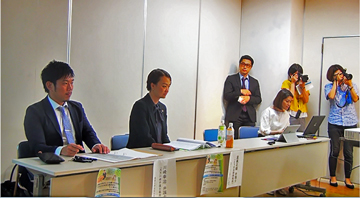 |
|||||||||||||||||||||||||||||||||||||||||||||||||||||||||||||||||||||||||||||||||
|
|||||||||||||||||||||||||||||||||||||||||||||||||||||||||||||||||||||||||||||||||


